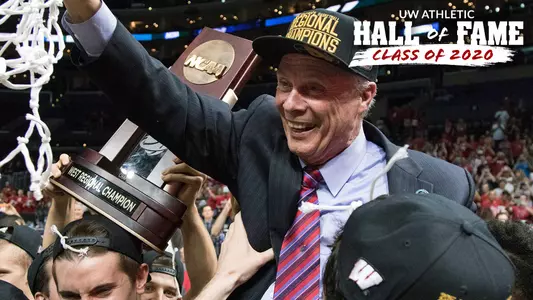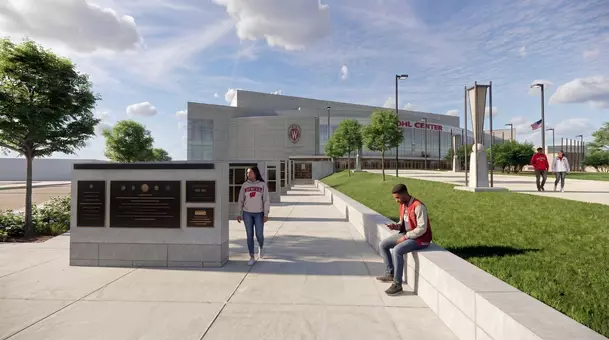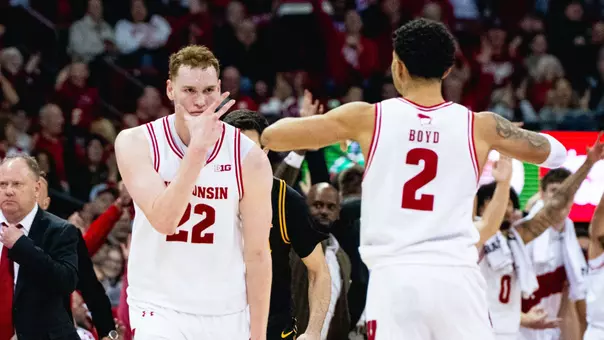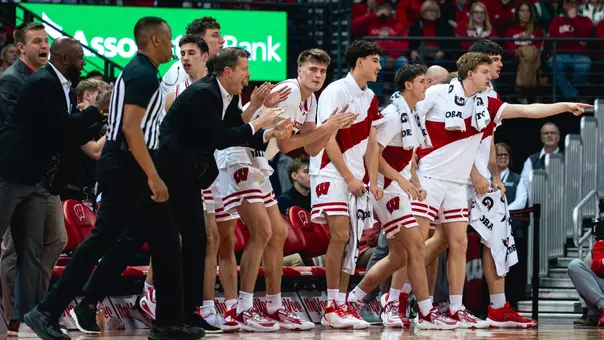
2020 UW Athletic Hall of Fame: Bo Ryan
June 26, 2020 | General News, Men's Basketball, Mike Lucas
Men’s hoops coach led Badgers in rewriting history
 |
||
|
The 2020 class of the UW Athletic Hall of Fame has been selected and new members will be announced from June 15 - 26. Visit UWBadgers.com each day to celebrate each new member of this distinguished and historic class of Badgers!
BY MIKE LUCAS
UWBadgers.com Senior Writer
MADISON, Wis. — Bo Ryan's favorite buzz word has always been "NEXT."
Its genesis can be traced to a playground court with steel nets on 8th and Pennell Streets in his hometown of Chester, Pennsylvania. To the hardcore local ballers, it was known as "The Cage."
If you were on the winning side during the pickup games, the losers walked, and you'd stay on the court and offer the challenge "Who's got next?" Make the last shot and it was simply 'Next.'
Once he got into the coaching profession, it was no different. Only he needed a break to get from Brookhaven Junior High in Delaware County, Pa., to what was "next." Or he needed someone to have enough faith in his work at Sun Valley High in Aston, Pa., that it would open the "next" door.
A few years earlier, he had left Brookhaven to take an assistant's job at Dominican College of Racine, an NAIA program in Wisconsin. But the school went bankrupt by the end of his first season. And he was left coaching the baseball team without pay that spring and collecting unemployment.

Not all was lost.
Right after he got to Racine, he started dating a secretary in the Dominican College athletic department. The following summer, Bo and Kelly, a Chicago girl, got married and spent some of their honeymoon pulling a U-Haul to Aston where he was about to make $11,800 a year at Sun Valley.
By his own admission, Ryan matured as a coach during his two seasons in Aston; some 10 minutes from his prep alma mater in Chester; and 20 miles from Philly. He was also taking classes at Villanova with the idea of becoming a high school principal when he was done coaching.
While waiting for "NEXT" — that next opportunity — Ryan got a call from his former Dominican College head coach, Bill Cofield who had just taken over the University of Wisconsin program and offered Ryan a position on his staff in Madison. The irony was not lost on Ryan.
Cofield, the first African American head coach of a major sport in Big Ten history, had encountered many closed doors in the pursuit of his dream. And now he was opening a door for Ryan, who signed his UW contract on March 17, 1976 — St. Patrick's Day. It was his ticket to next.
"Somewhere along the line," he said, "somebody has to believe in you in this profession."
Forty-four years later, William (Bo) Ryan is going into the University of Wisconsin Athletic Hall of Fame.
"To go into this Hall of Fame," he said, "I'm extremely proud to represent the people who helped along the way, especially the guy who gave me my break. I think back to Bill Cofield and the opportunity that he gave me. Unfortunately, he never got a chance to see his protégé …"
Run his own college program.
Cofield lost his battle with cancer in 1983. He was 43.
A year later, Ryan was hired at UW-Platteville where he built his own system, carved out his niche and went on to win four national championships. Since then, the 72-year-old Ryan has been inducted into multiple Hall of Fames. As a prep and college player. As a Division III and Big Ten head coach.
"It's kind of neat because it always reminds me of the teammates and coaches that I've had," he said of the HOF recognition. "It always serves to me as a reminder of how many lives have had a chance to touch me as well as the chances that I've had to touch the lives of so many others."
In three-plus decades as a head coach, he had one losing season. His first at Platteville.
"Losing didn't feel right, but we ended up turning it around," he said. "I don't have a lot of patience. That's not something I've been associated with. I tend to be impatient. The thing that got me through that first year was that I had to remind myself that I was coaching 90 percent freshmen.
"Never did I ever get in my car after a practice or after a game … (pause)
"and ever thought about doing anything else. Never. Ever."
And if you were wondering …
"I could have stayed at Platteville forever and never blinked because I was doing what I felt was my calling: I was teaching and coaching. I was okay with being at Platteville. I was never a guy who went for fancy cars or boats or jewelry. I came from a pretty simple background."
Simplicity was the essence of his coaching.
UW's fifth-year head coach Greg Gard was among those influenced early-on by Ryan.
"And that was before I even got on his staff at Platteville in '93," said Gard, also a Ryan assistant at UW-Milwaukee and Wisconsin. "Before I got into the coaching world, whether I was in high school, or my early couple of years of college, I remember sitting in the stands watching his teams play.
"I remember how his teams were a reflection of him. They were precision-like, well-drilled, well-schooled. I loved how they played. I loved how tough his teams were. There were a lot of things that I gravitated towards and when I got to work side-by-side with him, you saw the complete body of work."
Ryan won 747 games collegiately: a school-record 364 at Wisconsin. His Badger teams never finished lower than fourth in the Big Ten, never missed the NCAA tournament. Ryan, a four-time league Coach of the Year, won seven league titles and guided the UW to back-to-back Final Four appearances.

He'd also be the first to admit that he recruited and/or developed a lot of good players.
The first or second-team All-Big Ten list under Ryan included Kirk Penney, Devin Harris, Mike Wilkinson, Alando Tucker, Kam Taylor, Brian Butch, Michael Flowers, Marcus Landry, Trevon Hughes, Jordan Taylor, Jon Leuer, Sam Dekker, Nigel Hayes and Frank Kaminsky, the National Player of the Year.
There were so many others like Josh Gasser who were invaluable leaders.
It would be unfair for Ryan — just ask him — to single out his best player. Or even his Top Five.
But what would Ryan's composite player look like?
"I would take someone who was athletic enough to guard just about anybody on the court," he said. "Someone with long arms — I always look at wing spans — and lateral movement."
Without prodding, he volunteered a name.
"Michael Flowers could guard anybody up to a 5-man," said Ryan, listing his "versatility, tenacity, toughness" on defense to go along with the threat that he posed at the other end of the floor.
"Offensively, you wanted someone who's wiry, bouncy. Can score inside, can score outside."
Ryan dropped another name: Alando Tucker, the UW's all-time leading scorer.
"The swing offense was built for guys like him and Mike Wilkinson, Brian Butch and Frank Kaminsky …" said Ryan, pulling up realizing he was doing what he didn't want to do. Naming names.
As it turns out, Wilkinson and Ryan are members in the 2020 Hall of Fame class.
"A guy like Mike Wilkinson," he said, "could guard 3's, 4's and 5's."
Ryan called a timeout. To tell a story.
"I saw a guy driving a tractor on some land they were renting from my brother and sister-in-law out in Arena. I said, 'That's Mike Wilkinson.' I waved and later on he stopped over. He's living large. How about doing something in life you said you wanted to do and then end up doing. That's pretty good."
Back to the composite player. A Flowers-type on defense, a Tucker-type on offense.
"Doesn't have to be the most athletic person," Ryan noted. "But it has to be someone who values every possession, someone who cares on offense and defense. It's really the mental part. Just give me guys who care. And if they care, our staff can get them better."
Ryan's competitive zeal has always been one of his strongest characteristics.
"He had a lot of competitive players who played for him, really good players at all three places," Gard conceded. "But he was able to instill a unique level of competitiveness and will power in his teams. I saw the everyday heartbeat and how he operated, the competitive fire. He willed us to a lot of wins."
Gard then cited another Ryan strength: the attention to detail through a consistent approach.
"And it was the simple details," Gard said. "It wasn't extravagant. It wasn't multi-pronged. It was very simple. As in, 'Here's what you have to do.' We're not going to do 100 different things. We're going to do our things and we're going to do them really well."
Rob and Carlton Jeter played for Ryan at Platteville. They are the sons of the late Bob Jeter who started at cornerback for the Green Bay Packers in three straight NFL championship games and the first two Super Bowls. Gard remembered how Ryan used to pick the brain of the elder Jeter.
"Bob talked to him a lot about Lombardi," Gard said. "There was a very simplistic approach that Lombardi had from what I gathered. I'm sure under the hood there were more moving parts to it than on the surface. But there were things that he learned from Jeter in terms of working your plan."
Ryan amplified.
"Bob Jeter and I had some great, great conversations," said Ryan, a diehard Philadelphia Eagles fan. "He would give me some of his Lombardi-isms and tell stories about what it was like to be in that locker room with Herb Adderley and Jim Taylor and Bart Starr and all of those great Packers.
"When Bob Jeter was talking to me, all I pictured was my dad, Butch, who had three football plays and his teams won 90 some percent of their games — with only three plays. I don't know how many plays the Packers had, but it sure looked like they were running the same ones over and over.
"I grew up with simplicity. Don't let the little things beat your teams or get your players in positions that they're not comfortable with. A lot of coaches would watch our practices and say, 'Man, does he work a lot on special situations.' Up two with 10 seconds. Down two with five seconds.
"In all those games where you saw we won with shots at the buzzer or leading up to it, there was a method. So even if we didn't have any timeouts left, the players knew what was coming. That's the nice part when the players believe and think to themselves, 'I've been here in this situation before.'"
Will Ryan surely can relate to how his dad's system worked as a player and assistant. That knowledge gleaned from first-hand experience — on the Platteville and UW-Milwaukee rosters and the Badger staff — should bode well for Ryan, 41, who was recently named the UW-Green Bay head coach.
"He gets a head coaching job at 41 in Division I and I was 60 when I went to UWM, so he's got me beat," Bo Ryan observed with a snicker. "You know what? It's a great opportunity. And one of the clinchers was what he did with that team in West Virginia. He really surprised a lot of people."
Last year, the younger Ryan coached Wheeling University, a Division II program, to a winning record (14-13).
That far exceeded anyone's expectations since Wheeling had been picked for last place.
"Kelly and I are extremely proud," Bo Ryan gushed. "Will was able to be around programs that were successful, not only ours when he worked with us. But he worked with Saul Phillips at North Dakota State and Ohio. He's as prepared as anyone to be a head coach, if not more prepared."
But will he have to deal with a different layer of expectations as Bo Ryan's kid?
"No, I don't think that will be the case — he knows there's too much work to be done to ever be concerned about that," Bo insisted. "In this day and age, you have to have thick skin anyhow. A lot thicker skin then let's say my generation because we didn't have all that public backbiting.
"You could go to the office, go to practice, go back home and not have something in your hand that has 9,000 people saying, 'The guy can't coach …'
(He was referencing the various social media platforms, Twitter, Facebook, etc.)
"Am I concerned that people will compare him to me? No. He's got bigger fish to fry than that. He's got players to teach and a program to put together in Green Bay. And you have a lot more work now to keep the players that you have because of the transfer portal and all that.
Considering that Hall of Fame head coach Jim Calhoun, now 78, came out of retirement to coach again at the University of Saint Joseph (West Hartford, Connecticut), has Bo Ryan had any urge to get back into the profession? After all, he's much younger than Calhoun.
"Not really," he said. "I wanted to retire someplace where I could play golf three or four times a week. I wanted to play golf and have my oneness with nature. Kelly and I are enjoying our kids and grandkids. When you're coaching, you blink and the next thing you know, your kids are adults."
Any chance Bo Ryan would join Will Ryan's staff, if asked?
"No, there's no way in the world that I could hit a 4-iron in January in Green Bay," cracked Ryan, who spends his winters in Palm Springs, California. "But I'll go up there a few times and I'll check out a few workouts and some practices. Maybe I'll offer up a tip or two."
Next.














